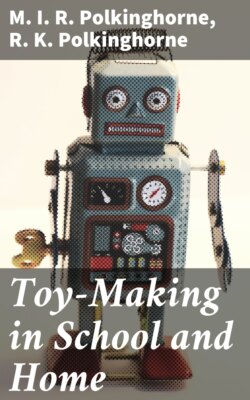Читать книгу Toy-Making in School and Home - R. K. Polkinghorne - Страница 8
На сайте Литреса книга снята с продажи.
ОглавлениеBest trust the happy moments. What they gave
Makes man less fearful of the certain grave,
And gives his work compassion and new eyes;
The days that make us happy make us wise.
Moreover, every teacher of handwork knows how little ease the busy children in her classes get—in these classes they are never passive listeners or passive learners by heart. They see the need of accuracy, the labour necessary to produce it, they suffer for every mistake they make, they realise some of the joy and pain of creating, and, best of all perhaps, they realise the joy of work—active, muscular work as distinguished from their ordinary scholarly work.
With regard to the question of work it has been ably said that "No one has yet preached in an adequate way the gospel of work—real hard work—as the most amusing of all occupations—not a noble duty."
It is somewhat unfortunate that directly one begins to like one's work one is accused of playing.
To return to toy-making (which is work or play, according to whether one dislikes or likes it)—whether toy-making be taken in the school or not, the teachers will find it a useful hobby. Through it they can amuse themselves and renew their youth; through it they will have an enduring bond of union with their children.
Our knowledge of history and geography often fails to impress our children; they probably think we are a little foolish to burden our heads with so many facts that seem to have no bearing on to-day; but when we can use our hands and make a toy they see us with other eyes, we are really clever people worth cultivating.
If toy-making be taken as a form of handwork in school, one enlists at once the interest of the parent—especially of the father—the mother sometimes, not often, objects to the mess. This interest of the parents is a great gain; the father delights in doing a bit of the work—sticking on the difficult funnel, sawing the hard piece of wood; child learns from parent, and parent from child, and in this way the father may again remember half-forgotten ambitions, half-neglected talents, and find in toy-making a profitable occupation, profitable mainly in the fact that any occupation which recalls to the grown-up person his youth, with its fresher outlook on life, must be wholesome.
Finally, if the handwork classes make the children more 'at home' with themselves and with life, they will have done something; if they help them toward self-realisation they will help them toward the joy the writer speaks of who says, "Joy of life seems to me to arise from a sense of being where one belongs, as I feel right here; of being four-square with the life we have chosen. All the discontented people I know are trying sedulously to be something they are not, to do something they cannot do.... It is curious, is it not, with what skill we will adapt our sandy land to potatoes and grow our beans with clay, and with how little wisdom we farm the soil of our own natures?"
